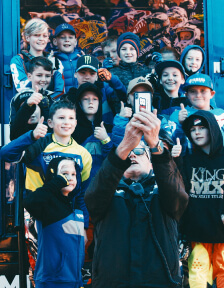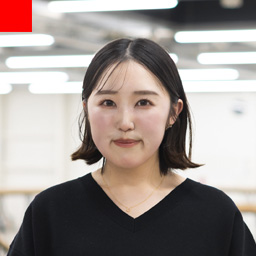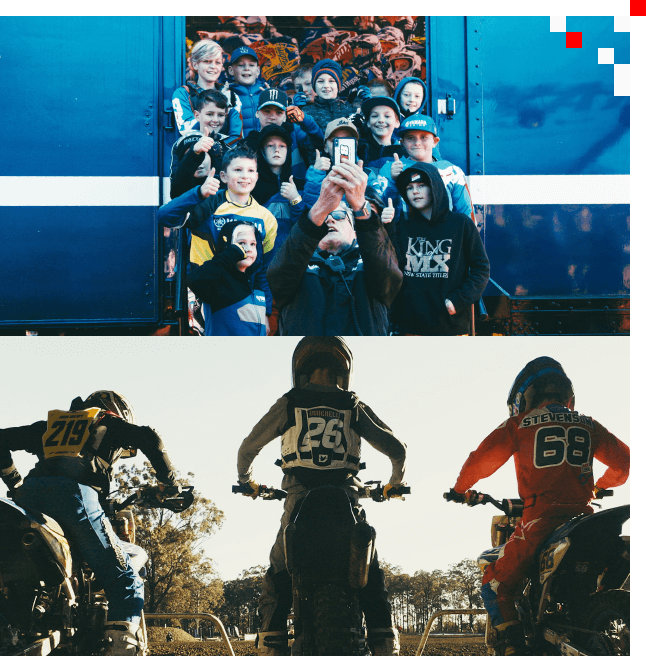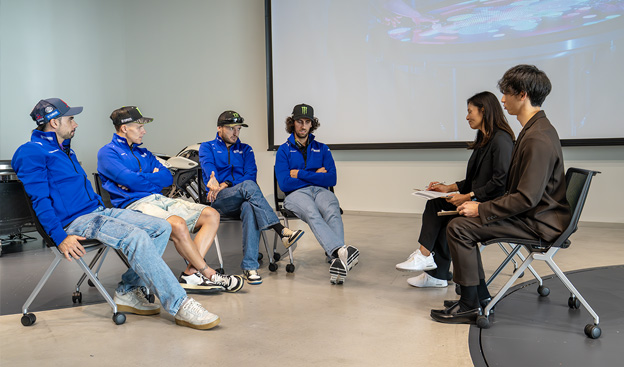About Yamaha Motor’s
“Human Research”
Yamaha Motor aims to be a “Kando Creating Company.”
In specific terms, that means providing experiences that move both the body and heart and can be enjoyed in a more active and self-motivated way. This is why we strive to create new Kando with people around the world.
To achieve this goal,
there are always some basic questions we must face.
When do people experience Kando?
What does it mean,
and what happens when people experience Kando?
What does Kando contribute to our lives?
The “human research” we engage in is one of the basic research fields that make Yamaha Motor the company that it is. The more research we do, and the more we learn from this research, the more we have come to realize that we humans really don’t know all that much.
Human beings are complex. But that is what makes it so fascinating.
That is what has inspired Yamaha to undertake human research.
We hope you will watch to see what new Kando this will lead to.
*Kando is a Japanese word for the simultaneous feelings of deep satisfaction and intense excitement that we experience when we encounter something of exceptional value.
About Our Research Activities
Here we introduce the contents of the research we are conducting on a daily basis.
-

Research 01
Understanding human emotional responses through cultural differences
A Cross-Cultural Study of Kando
-

Research 02 ・ 03
Exploring basic human characteristics, deepening understanding of human beings
Research on Attachment /
The Two Yamahas’ challenge to understanding and Re-creating our Kando -

Research 04
Quantifying basic human characteristics and embodying them
Expanding human senses and perception to accelerate Jin-Ki Kanno
-

Research 05
Understanding the past to create new culture
Cultural Creation Marketing Research
A Cross-Cultural Study of Kando
Understanding Human Emotional Responses Through Cultural Differences
Cross-cultural research is an effort to compare, using a shared framework, how humans understand the world and what they value — shaped by differences in country or region, generation, and personal background. Focusing on experiences such as Kando, this research visualizes as data what humans feel in different situations and how they assign meaning to those experiences. Through collaborative research with academic and industry partners, the insights gained are used as a foundation for envisioning mobility, services, and brand experiences that are appropriate to each region. This cross-cultural perspective is also a unifying theme that runs throughout Yamaha’s approach to human research.

Research Members
-

Takashi Suegami
Ph.D. in Psychology
Technology Strategy Div.
Technical Research &
Development Center -

Yui Kawashima
Technology Strategy Div.
Technical Research &
Development Center
Research on Attachment
Attempting to structuralize the nature of attachment to envision new value
“Attachment” is the feeling that something is important to you, or that something has special value to you. It may be your motorcycle that you love, some small leather item, or a denim item. In this way, such items of attachment vary from person to person, and the reasons behind that attachment are infinitely varied as well. Also, the definition of attachment itself is not clear. In our research, we adopt a dual approach to the questions of what the attachment people feel for things is and what causes it, combining a practical approach from the perspective of design and a theory-based academic approach.
The structuralized concept of attachment we arrived at through this research will be applied to our product development and marketing policies with the aim of making the products and services we offer higher value to the customers than ever before. The new value that we seek to create and supply to the world will be provided not only by product specifications, but also by what we have discovered in search of answers to the question, “What creates such feelings of attachment?”, as analyzed from a variety of perspectives. This is our unique form of research aimed at creating a new joy in people’s lives.

Research Members
-

Takashi Suegami
Ph.D. in Psychology
Technology Strategy Div.
Technical Research &
Development Center -

Mio Nagasawa
UI/UX Designer
Brand Marketing Div.
Creative Center -

Teruhiro Hayashi
Researcher
Brand Marketing Div.
Creative Center
The Two Yamahas’ challenge to understanding and Re-creating our Kando
What is uniquely Kando that both Yamahas have sought?
Because we live in times of uncertainly that are seeing rapid changes in lifestyles and values, as well as technological advances, we at Yamaha Motor believe it is essential for us to pursue the kind of unchanging value that people seek. With our corporate mission of being a Kando Creating Company, the kind of value we seek to create is value that brings people Kando. Together with Yamaha Corporation, we are collaborating with a theoretical biologist Dr. Mark Changizi and prof. Shinsuke Shimojo lab at the California Institute of Technology as research partners to explore what results in an experience of Kando, a sensation common to the corporate philosophies of both Yamahas.
To research the kind of Kando that is created through physical activities such as riding or driving a vehicle or playing a musical instrument, we start with the hypothesis that the strength of emotions and the temporal changes in emotions are important factors, and to verify this assumption, the two Yamahas have created an installation to artificially produce Kando, which is named “e-plegona.” Through this attempt to analyze the question of “What is involved when people experience Kando?” from the perspective of science and art, we will work to connect it to new excitement for the future.

Research Members
-

Takashi Suegami
Ph.D. in Psychology
Technology Strategy Div.
Technical Research &
Development Center -

Teruhiro Hayashi
Researcher
Brand Marketing Div.
Creative Center -

Shuichi Higaki
Researcher
Human Science Lab. Group,
Technology Strategy Division,
Technical Research
and Development Center -

Kao Yamaoka
Senior Chief
Human Science Lab. Group,
Technology Strategy Division,
Technical Research
and Development Center
New Human-Machine-Interface
Expanding human senses and perception to accelerate Jin-Ki Kanno
Yamaha Motor has an exclusive development ideal we call Jin-Ki Kanno. Based on the unique thought that a high level of unity between the user and their machine can bring a joy we describe as seductive exhilaration, this development ideal is put to use in all types of Yamaha workplaces, where it is built into our products. Research on Jin-Ki Kanno is still continuing today, and one area of it is designing new Human-Machine-Interface to expand human innate sense or perception by combing technology which is biologically or neurologically principled.
Current version of our new HMI is an exclusively developed device which auditory assists human perception of non-visible or hard-to-see object. This device informs a rider/driver of the position and course of an object approaching from behind, not through the visual information from the rearview mirrors, etc., but audibly via the sense of hearing. Eventually, this device will be used to enable users to intuitively grasp surrounding traffic conditions and thus help motorcycles and other vehicles to be controlled more safely and with more enjoyment. We continue our research day by day with the vision of this kind of future in our minds.
*HMI: Human-Machine-Interface

Research Members
-

Takashi Suegami
Ph.D. in Psychology
Technology Strategy Div.
Technical Research &
Development Center -

Masaki Watanabe
UI/UX Designer
Brand Marketing Div.
Creative Center -

Shuichi Higaki
Engineer
Project Development Div.
Technical Research &
Development Center
Cultural Creation Marketing Research
Understanding the past to create new culture
Beginning from its first motorcycle, the YA-1, Yamaha Motor has continued to be a market leader by constantly offering new value through its products. However, our corporate aim is not merely to expand the market by selling our products. Another of our especially important aims is to offer new Kando that has never been experienced before to create new culture together with our customers. To achieve this goal, we are conducting research with the aim of taking the social and cultural changes in Japan and abroad as context for gaining both academic and objective understanding of new movements occurring around the world so that we can predict what new culture should be coming next. We are also using the results of this research as the basis for undertaking challenges to create new culture ourselves.
In our most recent research, we have found evidence of a new culture growing in the U.S. among off-road bike customers and the surrounding people involved, and by utilizing ideas gleaned from sociology, anthropology and psychology, we are looking for hints toward building a new culture.

Research Members
-

Takashi Suegami
Ph.D. in Psychology
Technology Strategy Div.
Technical Research &
Development Center -

Yui Kawashima
Technology Strategy Div.
Technical Research &
Development Center

